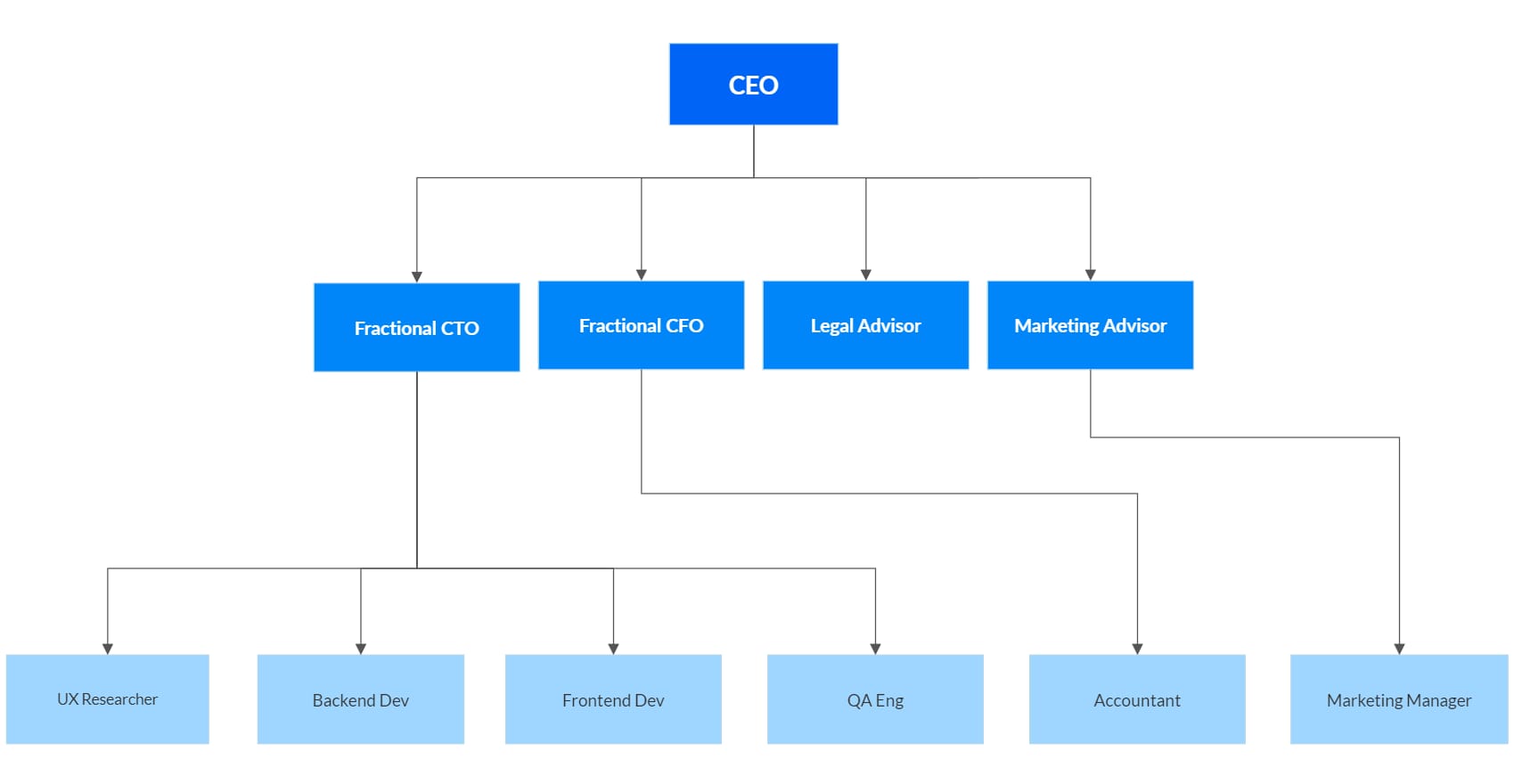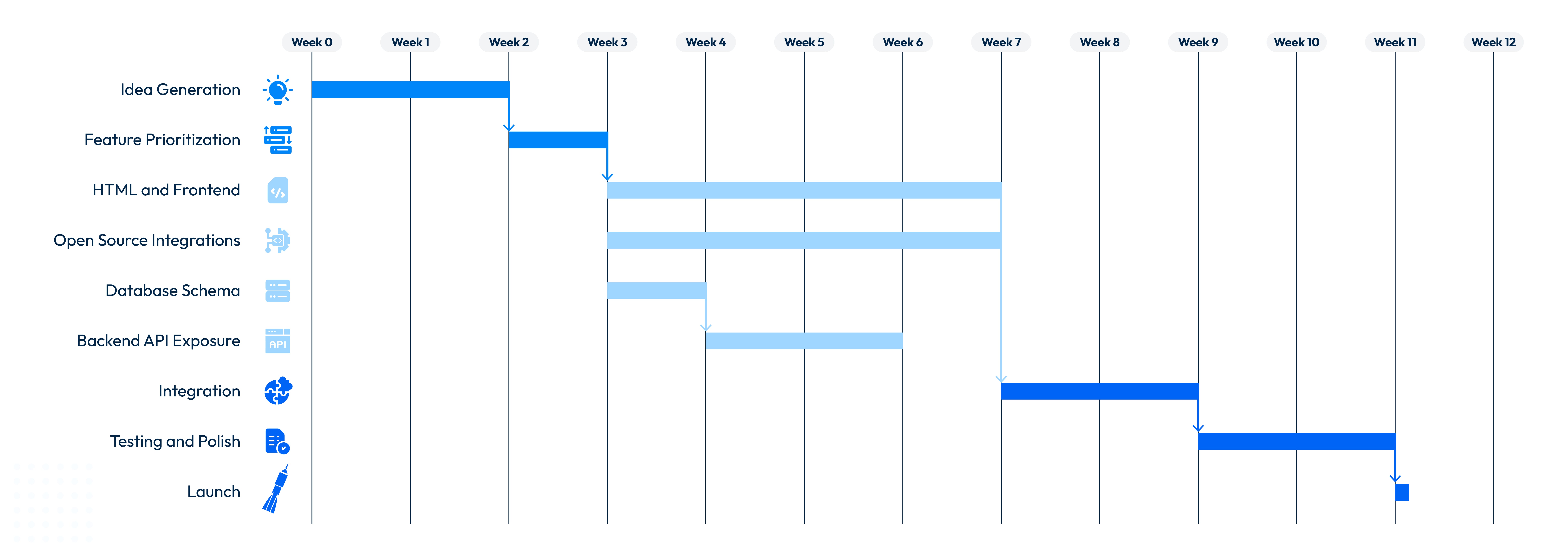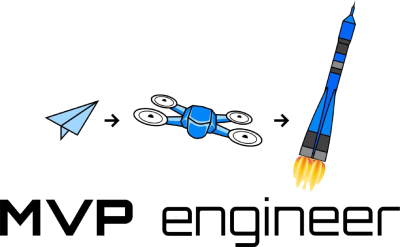Fractional CTO Services From MVP engineer

Starting a fresh idea? Fractional CTO services should be the first dollar spent. They determine the usefulness, offer guidance on corporate strategy, and develop a functional demo within budget. Here, we dive into why a fractional CTO is a must-have for achieving product-market fit.
What is a Fractional CTO?
A Fractional CTO is a part-time leader who helps startups. They offer tech advice and guide the company in making important tech-related decisions that can greatly influence the startup's success.
Unlike a full-time CTO, a fractional CTO works exclusively on a project basis and specializes in hyper-nimble development work. Their part-time involvement and specialized approach make them ideal for small startups and new initiatives. The nature of the working relationship allows the company to pivot and toss out ideas while searching for product-market fit.

Why are Fractional CTO Services Important?
The success of a new venture entirely depends on a strict evaluation of its usefulness, cost, competency, and security. That's where a virtual CTO come in.
Fractional CTOs offer important tech knowledge and can help business owners make key decisions about tech projects. These decisions can greatly affect the success of the business. Fractional CTOs collaborate with the product development team to make sure they meet the client's needs.
In addition, they can leverage the latest technologies to build competitive advantages and ensure that ideas meet the necessary success criteria. This invaluable guidance is critical in the early stages of a startup's development.
Furthermore, it makes sense to hire a CTO with experience in your company's stage who specializes in hyper-nimble development work. The fractional CTO's agile approach is necessary for testing and navigating changes to find a unique value proposition quickly. Overall, it's certain that fractional CTO services are essential for achieving product-market fit in today's competitive landscape.
How a Fractional CTO Can Propel Your Business Forward with Cost-Effective Tech Leadership
1.Feature Ranking
One of the most important tasks that a fractional CTO can help with is feature ranking. Identify the most important features for your product and decide which ones to develop first. There are a lot of factors that need consideration when ranking features, but mainly:
Customer needs: What features do your customers need?
Market trends: What features are your competitors offering?
Technical feasibility: What features are technically feasible to develop?
Business goals: What features will help you achieve your business goals?
After evaluating all of these factors, it should be evident which features to prioritize.
2.Technical Scoping
It's essential to set expectations for feature delivery to meet business goals. Knowing how much development dollars and time cost is key when planning implementation of emerging technologies, fundraising, marketing outreach, and user research. It is essential to have the right technical team ready to achieve a successful product development outcome.
A part-time CTO can help here. With their tech knowledge and experience from many similar projects, they can guess potential problems and set achievable goals. He can also write software design docs and system architecture for coding execution by the technical team.
Working straight with an outsourced development shop can often result in building too many new features. So, it's important to consider the extra benefits of having a temporary CTO in your team.
3.Technology Roadmap and Business Need Advising
Knowing how to place features into the Gantt chart to maximize impact takes time and effort. What comes first, and what are the dependencies of each task? The fractional CTO knows the business objectives and the details of the MVP buildout. By understanding both deeply, you can make tradeoffs for tech strategy.
These tradeoffs are often challenging to measure. Scaling vertically on cloud computing vs finding and optimizing the underlying algorithms is a difficult tradeoff. We measure these two business goals in different "currencies". Either it's engineering time spent or devops and operational budget.
Calculating the "exchange rate" between the currencies is challenging and dependent on deep experience in similar abstract calculations. It's important to consider digital security risks in the plan. In some industries, it might be better to wait before focusing heavily on strong security.

4.Hiring and Management
Hiring a chief technology officer for your startup is challenging. You need a person who's not only good with technology, but can also expand and run the tech team. Develop a positive work atmosphere for engineers of various personalities.
A fractional CTO can do this. They handle everything from leading the tech team, hiring and reviewing tech leaders. To oversee work and add more engineers from outside if needed.
The CTO's role is crucial in making tradeoffs for speed and quality regarding technology growth potential. Poor quality can delay your long-term goals. But being too perfect can stop your short-term work.
The CTO must make the right call to move quickly to achieve speed and quality. With the right technical advisor for the small business, founders can turn their dream of crafting a standout, cutting-edge product into reality.
The Benefits of Hiring a Fractional CTO: Cost-Effective Technology Leadership for Startups
For startups navigating the evolving business landscape, the Fractional Chief Technology Officer emerges as a key asset. This role combines strategic insight and technical prowess, custom-fit for the dynamic and economically mindful climate of growing businesses. We'll examine how a Fractional CTO can significantly influence a company’s trajectory, highlighting the numerous advantages for businesses ready for evolution and progress.
- Strategic Planning in Technology: Aids in crafting an extensive tech strategy in harmony with company aims and projected growth.
- Financial Prudence: Provides top-level tech guidance more economically than a traditional full-time CTO, offering a budget-friendly option for startups.
- Leadership in Technology and Team Oversight: Offers seasoned leadership in guiding tech teams and refining development practices.
- Scalable Solutions and Decision-Making Agility: Creates adaptable tech frameworks and assists in informed decision-making for technology selection and scalability.
- Expansive Network and Resource Access: Delivers an extensive array of contacts and resources within the tech sector, crucial for forming partnerships, securing funds, or recruitment.
- Unbiased Tech Assessment: Presents a neutral viewpoint in evaluating and suggesting tech solutions tailored to the startup’s requirements.
- Risk Management: Engages in comprehensive risk analysis and formulates strategies to reduce potential tech risks.
- Access to Diverse and Advanced Tech Skills: Provides exposure to a wide range of specialized tech expertise critical for unique industry demands or product development.
- Enhancing Speed to Market: Employs agile methodologies to hasten the development cycle, enhancing the startup's capacity to rapidly launch products.
- Aligning Tech Strategy with Company Growth: Ensures that tech decisions bolster the startup's growth plan and company aims.
- Continuous Tech Innovation: Stays current with the latest tech trends, cultivating an environment of innovation within the company.
- Versatility Across Different Environments: Apt for startups, businesses in transition, non-tech industries, and geographically dispersed operations.
This approach underscores the Fractional CTO's role as not just a technologist but a strategic partner, vital for startups seeking a balance between innovation, growth, and financial astuteness.
Decoding the CTO Types: Full-time, Part-time, Interim, and Fractional - What's the Difference?
In the fast-paced digital business world, choosing the right technology leadership is critical. Here, we decode the four primary CTO types: Full-Time, Part-Time, Interim, and Fractional.
Full-Time CTO
Full-Time CTOs are executive team members, immersed in managing the company's technology aspects. Ideal for larger organizations, they shape tech policies and future growth. However, their high cost may not suit smaller enterprises or startups.
Part-Time CTO
Part-Time CTOs are contract-based tech leaders, working a set number of hours or days per week. They provide strategic guidance on technology to startups and small businesses that need CTO expertise without the full-time price tag.
Interim CTO
Interim CTOs step in during leadership gaps, such as transitions, significant projects, or crises. They maintain strategic consistency, providing stability in times of change.
Fractional CTO
Fractional Chief Technology Officers are the rising stars of tech leadership. Even though they're part-time, they sure pack a punch. They offer strategic tech knowledge to businesses that can't pay for a full-time CTO or need more tech leadership.
Each type of CTO serves a unique purpose, fitting different needs and circumstances. Understanding these distinctions empowers you to make the best tech leadership decision for your business. We'll further compare these roles in the next section, providing deeper insights to help refine your choice.
Fractional CTO vs. Others: Detailed Comparison
When thinking about tech leadership, it's important to consider how a part-time CTO is different from other CTO roles. Let's break it down:
Value for Money
Fractional CTOs are the budget-friendly champions. They deliver strategic expertise akin to Full-Time CTOs, but at a fraction of the cost. While Part-Time CTOs offer similar cost advantages, Fractional CTOs typically bring a wider range of experience. Full-Time and Interim CTOs are costlier due to their constant engagement.
Flexibility
Fractional CTOs shine in flexibility. They adapt to your needs, scaling their time commitment up or down as required. Full-Time CTOs are, by nature, less flexible, and Part-Time and Interim CTOs operate within set terms.
Diverse Expertise
While Full-Time CTOs deeply understand your business, Fractional and Part-Time CTOs bring fresh external perspectives, often sparking innovation. They draw on a wide array of experiences from various industries. Interim CTOs are typically seasoned leaders, guiding during periods of transition.
Strategic Input
All types of CTOs help with the big plan, but fractional CTOs are special. They can give top- level strategy without working full time. Like a Full-Time CTO, they invest in aligning your tech roadmap with your business objectives.
In short, Fractional CTOs present a cost-effective, flexible option, brimming with diverse expertise and strategic input. But remember, your decision should align with your company's specific needs and resources. It's about striking the perfect balance between what your business requires in tech leadership and what it can reasonably afford.
Fractional CTO Rates
Tech's a tough game these days, and everyone's scrambling to get their hands on a top-notch CTO. Companies are on a quest for expert CTOs to guide them through the ever-changing digital landscape and outpace the competition. Hiring a full time CTO can be expensive and often beyond the reach of smaller companies. Which is where part time CTOs come in.
Part time CTOs offer companies technical leadership without committing to a full-time salary. Rates for part time CTOs range from $150 to $600 per hour. Making it cost-effective for companies looking for great value.
Compared to the market value of software development at larger companies like Google. Part time CTOs are ideal for those seeking experienced leadership on a budget.
Final Words
In a startup, a fractional CTO can make magic happen. Their unique combination of technical expertise, market research, and business acumen can make them invaluable in achieving product market fit. With an essentialist approach, minimizing wasted cycles is key to success. Consider hiring an experienced and specialized CTO to help guide your technology strategy and digital transformation journey. At MVP engineer, we focus on the impact of new technology. Every action must move the needle to gain a competitive advantage. Reach out to explore our mutual fit.
FAQs Fractional CTO
What is a Fractional CTO role?
A Fractional CTO is a part-time or freelance Chief Technical Officer who provides technical guidance and advice, particularly to startups or small businesses. This role includes managing and overseeing the technology team and giving strategic direction aligned with the business objectives. It's often a more strategic and less hands-on role compared to a full- time CTO, allowing for cost-effective access to experienced technical leadership.
What does a Fractional CTO do?
The responsibilities of a Fractional CTO are diverse and can vary based on the company's needs. They typically involve establishing a solid technology strategy, ensuring the right technologies are used, creating and managing product roadmaps, overseeing technology developments and internal IT operations, solving problems for developers and IT team members, and managing strategic partnerships with technology vendors. They play a critical role in connecting upper management with tech teams and are involved in decision-making.
Why should I hire a Fractional CTO?
Hiring a Fractional CTO is beneficial when your company lacks a full-time CTO to handle strategy, particularly when facing challenges with an existing development team, such as missed deadlines or product issues. It's an effective solution for companies that can't afford a full-time CTO or for businesses that are growing and don't yet have enough work for a full- time role. A Fractional CTO brings a blend of technical prowess, strong leadership, and soft skills.
How do you find a fractional CTO?
To find a Fractional CTO, consider using specialized platforms like MVP Engineer, which connects you with experienced tech leaders suitable for fractional roles. Also, leveraging your professional network and seeking referrals can be a valuable strategy in finding the right candidate. For detailed information and to explore potential candidates, visit MVP Engineer.

